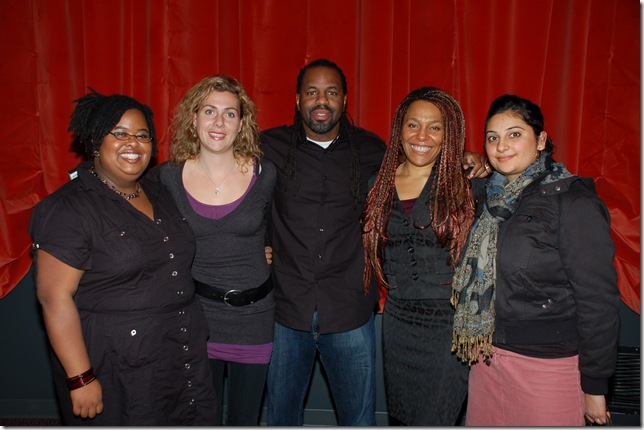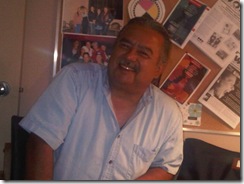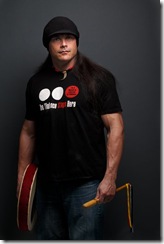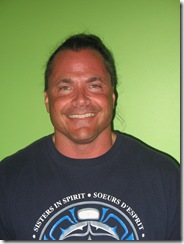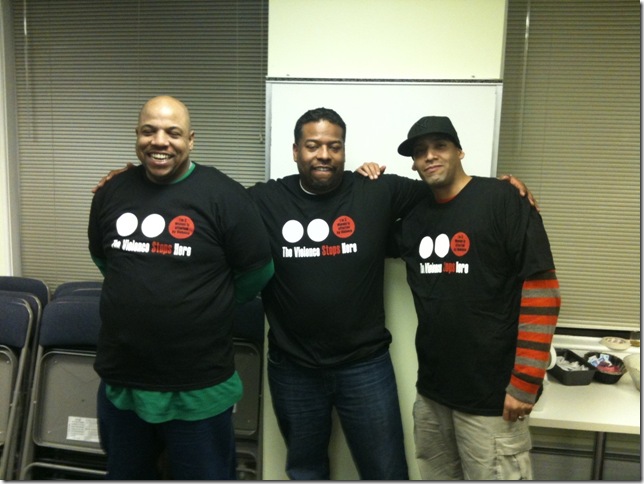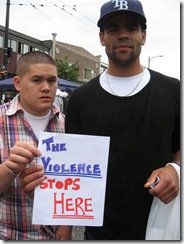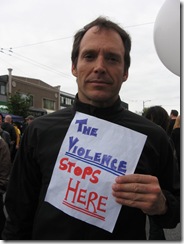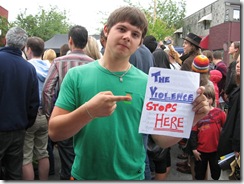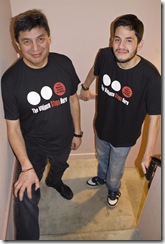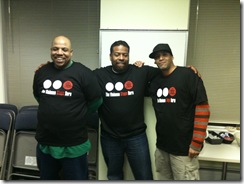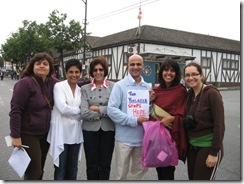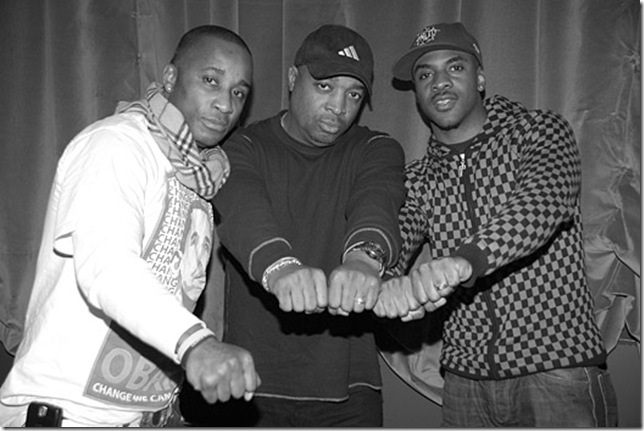My First Time
By
Byron Hurt
The first time I spoke out against men’s violence against women, I was mad nervous, yo. My talk was in front of a group of guys that I knew pretty well – the men’s basketball team at my alma mater, Northeastern University (NU) in Boston. I had never spoken to a group of men about sexism and violence against women before and the fact that I knew just about all of the guys in the room made my first experience doing so even more nerve-racking. Just two months earlier I was a student-athlete at NU, just like them. I was a former football player and had played numerous pick-up basketball games with many of the guys on the team. I had eaten dinner with them in the campus cafeteria, and partied with them around the city of Boston. Now I was back at my alma mater in a very different capacity – working as a mentor-training specialist for the Mentors in Violence Prevention (MVP) Project, a violence prevention program designed to encourage and inspire men to speak out against physical and sexual violence against women. I wondered if the guys would take me seriously.
The guys poured into the room after an intense basketball practice, tired from running sprints and shooting baskets for nearly 2 hours. Some dressed in sweats and flip-flops – others wore sweatshirts with jeans and sneakers. Several white colored cardboard boxes filled with pizza were laid out for the hungry team to devour during our talk. Bottles of soda and plastic cups lined the table. The small classroom with big windows had just enough desks to accommodate all of the players on the team, about 15 total. It was a dark Fall New England evening, around 7:30 p.m. No one on the team knew why he was there or what the presentation was about. The head coach, Karl Fogel, known for his brash and abusive coaching style, introduced Jackson Katz, the founder of the MVP program, and me to the team, and then quickly left the room. As the presentation got started, I remember feeling a little unsure if Jackson’s idea of teaching athletes bystander intervention in the face of men’s abusive behavior toward women would actually work. Jackson successfully used his passion and the power of persuasion to convince me that men needed to speak out against violence against women, but would it work with other male athletes? Honestly, I had my doubts.
I had been in the basketball team’s position before. As a former athlete, I remembered how inconvenient it was to sit through a stiff lecture given by a counselor, academic advisor, or guest speaker after a grueling practice. It could be unbearably boring. Physically, you are tired, your body aches, you have homework to do, and all you really want to do is eat dinner, go back to your room, and chill. Now, here I was, standing in front of the room preparing to give a lecture to guys who, I’m sure, didn’t want to be there. I felt like a union worker who crossed the picket line to go work for the corporate bosses in fancy suits.
Coaches and players generally view workshops like these as a colossal waste of time. I knew domestic violence wasn’t a priority for coach Fogel or the players. I also knew the only reason Fogel agreed to let his players participate in the 90-minute workshop was because the athletic director mandated all male athletes at NU go through the MVP program. I knew if Jackson and I were going to be effective at all, our presentation had to pull in guys immediately. But I wasn’t sure I could deliver. I had experience speaking on front of audiences, but I was new at speaking about gender violence. I lacked confidence and my stomach was wrapped in knots. Secretly I wished my first training session were somewhere far, far away, preferably in another state, in front of a roomful of guys I didn’t know. But here I was, in my own backyard, talking to familiar faces about a topic most guys regard as women’s issues. I knew that if I came off poorly, my masculine credibility would be in question with the guys. I was deeply afraid the basketball team would think I had gone soft.
Jackson, on the other hand, seemed much less nervous than me. The first man to graduate from the University of Massachusetts with a minor in Women’s Studies, Jackson received his Master’s degree in Education at Harvard University. He proudly declared himself a pro-feminist male. He knew all sorts of statistics about physical and sexual violence to support his argument that men needed to confront other men’s abusive behavior in order for it to stop. His analysis on gender violence was sharp and incisive. When it came to challenging men to take more responsibility for the high levels of rape, sexual assault, battering, and sexual harassment, Jackson had ice water running through his veins. His experience as a grassroots anti-sexist activist made him fearless in front of audiences of resistant, sometimes-hostile men. Me? I was green. I was young, unsure, and still grasping the bigness of the problem. I had no idea that violence against women was a global crisis. The idea that individual men who practiced sexism or abused women contributed to a much larger system of patriarchy that kept men in control over women, was a new concept to me. Prior to meeting Jackson, I knew a lot about how racism functioned in our society, but never saw the relationship between racism and sexism. Furthermore, I didn’t see how, as a black man, I could be a victim of racism yet perpetuate sexism. I didn’t know that one out of four American women would be raped or sexually assaulted in their lifetime. I had no clue that battering was the leading cause of injury in the United States – more than rapes and automobile accidents combined. And I certainly did not understand the terrorizing effect men’s abusive behavior had on girls and women.
It’s ironic that I didn’t see men’s violence against women as a big problem. It was part of my lived experience: as a boy growing up I had witnessed my father’s emotional abuse of my mother. I had seen men from all walks of life hit, harass, or sexually assault women. I heard guys tell sexist jokes at school on the playground, and in the locker room before and after practice. I admit, I laughed at many of those jokes. I cashed in on my currency as an athlete and had sex with adoring women who I had absolutely no interest in beyond sex. I called women bitches, hoes, sluts, and other negative words around my teammates, fraternity brothers, and other male friends. I viewed girls and women as disposable if they didn’t serve my interests or cater to my needs. I had double standards around sex – I could have a long list of sexual partners – but she could not. And, like my father, I had yelled and said mean-spirited things during emotional arguments with my girlfriends. Yes, it was all too familiar. Men’s violence against women was real.
So that night, in front of the men’s basketball team, I knew we were about to engage in real talk. What I didn’t know going into the session, is that I was going to learn almost as much as the basketball players would learn. My initiation into the world of anti-sexist activism was a night to remember.
To start the workshop, Jackson gave an overview of the program and told the team what we were there to discuss. When they learned we were there to talk about violence against women, the guys shifted in their chairs, looked around to each other, and murmured. After delivering a passionate intro, Jackson set the tone for the workshop. He then introduced me, and gave me the floor to address the team.
The room fell silent when I began to speak. I don’t remember exactly what I said, but I do remember stammering my way through my opening remarks, and speaking with a straight face, and a serious tone. It’s funny, looking back, how seriously I took myself. I wanted to convey to them that men’s violence against women was not a joking matter. I also wanted the team to view me as an authority figure, not a washed-up athlete returning to campus to pontificate.
I was stunned at how engaged the guys were as I spoke. They seemed to take my talk seriously, just as I had wanted. But now the hard work began. It was time to engage the men in an interactive conversation about gender violence and bystander intervention. After my remarks, Jackson passed out our teaching tool, the MVP Playbook. The Playbook contained a series of real-life scenarios placing men in the position of bystanders as a teammate made sexist comments or abused a woman. We asked for volunteers to read each scenario aloud, and then launched the group into a lively interactive discussion. Most of the guys had never men lead this kind of conversation before and listened intently as team members took turns debating how they would handle a teammate who was physically or sexually assaulting a woman. But some guys in the room postured in front of their teammates, looking disinterested. And whenever someone said something thoughtful or intelligent or challenged a teammate’s sexist comments, his teammates would laugh and tease him.
Most guys said they would never hit a woman. But as we delved deeper into the issues, guys began to reveal more and more of their innermost sexist opinions. Several team members made inappropriate comments and then snickered or sucked their teeth after I sternly corrected them. When I challenged them about their attitudes, they avoided looking inward and deflected physical and sexual violence onto women, claiming they were the real problem, not men. The more I challenged them, the more guys became defensive. I was trying to control their thoughts rather than guide the conversation and allow honest conversation to flow. Soon guys started to shut down as the conversation devolved into a battle between them and me. Instead of trying to reach the men, I was trying to show off the knowledge I had learned in the two months since I had joined the MVP team. As the facilitator, I wanted to win each argument. My first training session was getting off to a rocky start.
But Jackson bailed me out and taught me a few facilitation skills that I would later use in future training sessions. My serious demeanor, inflexibility, and lack of openness during the discussion didn’t go over well with the team. Jackson, on the other hand remained loose and comfortable with the guys’ honest responses. Jackson skillfully used humor and candid personal stories to pull in the men and ease their defensiveness. As a result, when Jackson spoke, the basketball team listened. I was uncomfortable in my skin while Jackson was completely comfortable in his. Initially, I thought they were taking Jackson more seriously because, by virtue of his white skin, they saw him as more of an authority figure than me. Looking back, though, Jackson was the authority figure in the room. His grasp of the issues, supported by sobering statistics and numbing personal anecdotes captivated the room. His passion, conversational style of presenting, and nonjudgmental responses was more inviting than mine. He was engaging while I was self-righteous and preachy.
Whenever one of the guys said something deeply sexist or made a comment that wasn’t well thought out, he allowed the team to debate amongst themselves and then inserted himself as the facilitator. He responded to the absurdly sexist comments with facts, and used racial analogies to make connections between sexism and racism. They listened to what Jackson had to say, not because he was white, but because of his command of the issues and because he made the issues relevant to them in a way I did not. When Jackson wrapped up the discussion, the team erupted in applause. We all had been schooled.
After the presentation, when the last guy had finally left the room, Jackson continued to teach me about the most effective ways to engage men. We recounted the night’s experience, and he explained to me that, for most guys, discussing gender violence in a roomful of other men is completely new and unexplored terrain. He explained how so many men have never had a conversation about sexism or violence against women – particularly a conversation led by two men. The process of allowing guys to talk and debate the subject, Jackson said, represented growth and progress.
I was thinking that the session with the basketball team was an utter failure and that I did a horrible job as a facilitator. But Jackson commended me for having the courage to challenge my peers about their sexist attitudes. “Don’t worry,” he told me. “The more you do this, the easier it will get.” I felt encouraged.
A few weeks went by when the NU News, Northeastern’s student newspaper reported that a men’s basketball player allegedly sexually assaulted a female student in one of the residence halls. Back at the office, the MVP staff received the news hard. Did this mean the program was ineffective? I wondered if our discussion with the team was a waste of time. Thinking we had failed, my doubts about the MVP Program changing men’s behavior seemed to be confirmed. On the day the NU News broke the story, one of the basketball players from the training session saw me walking up Massachusetts Avenue, not too far from campus.
As I waited for the light to change before crossing the street, he jogged over to me, and extended his hand. “What’s up B. Hurt?” he said. “Chillin’ man, what’s going on?” I replied as we dapped each other up. “You heard about what happened, right?” he asked. I was wondering if that’s what he wanted to talk about. “Yeah, I did. That’s messed up, man. What do you think about it?” I asked. He took a moment, shook his head, and answered humbly, “This violence against women thing is real, yo.”
After an awkward moment of silence, he continued, “I know you probably thought that no one was listening to you or took you seriously when you and Jackson Katz spoke to our team. But I just wanted you to know that even though I was quiet and didn’t say much, I was listening, man.” He apologized for his team’s immature behavior during our training session, and added, “I just wish my teammate had listened to what y’all were saying. No one on the team is laughing anymore.”
Unfortunately it took a teammate embroiled in a sexual assault case to reinforce the MVP message. “I hear you, man. You’re right,” I said. “It is a real issue. The cross light changed and we walked across the street, heading in separate directions. He gave me one last pound, and said, “Ayight man, I’ll rap to you later, brother. Thanks for talking to our team.” “Peace, man.” I said. “Thanks for approaching me and telling me that. I appreciate it.” “No problem,” he said. “Maybe we should have another one of those workshops,” he said, walking away, smiling. “Obviously we need more training.” “Keep doing what you’re doing, Byron. It may take a while, but you are making a difference.”
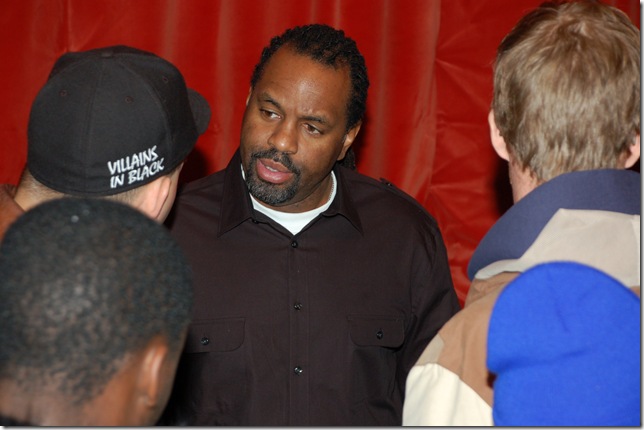
Byron Hurt is an award-winning documentary filmmaker, a published writer, and an anti-sexist activist. Learn more at www.bhurt.com.
